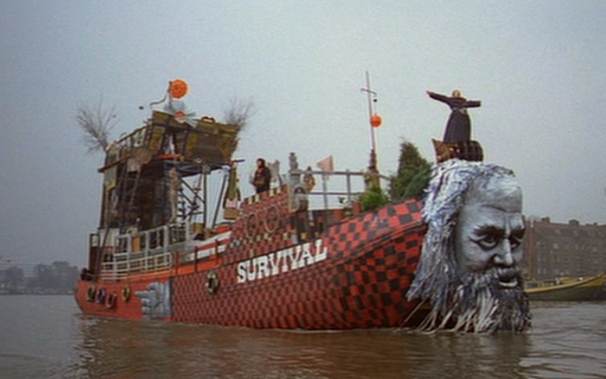
Sweet Movie
Dušan Makavejev's deliciously subversive 1974 political cartoon follows 2 very different women through various transformations. One is a virginal beauty contestant Miss World (Carol Laure) who escapes the bed of an American millionaire only to be used and abused by a series of men. Her Chastity Belt Foundation training involves using pelvic muscles to "kill the beast." This training proves unfortunate when in Paris she falls instantly in lust with the quasi-Mexican TV revolutionary Mr. Macho as her vagina traps Macho's member and the two get stuck together. An injected medicine releases Mr. Macho's penis but plunges Miss World into an infintile catatonic state (represented by her smashing eggs against her head). Her travels lead to a wild primal therapy commune where she is immersed in the infantalism of the others. She winds up naked, filming a commercial in a vat of chocolate. The other woman, Anna Planeta (Anna Prucnal), is a stalwart Marxist ideologue who ceaselessly travels the canals of Amsterdam looking for lovers (some being young preteen boys). She and newly arrived lover Pierre Clementi dressed like a sailor from the movie "Potemkin," strike up a "revolutionary" affair which ends after she murders him in a bed of granulated sugar. On a symbolic level, we're shown that ideology is attractive and addictive, like sugar, but in the end it only consumes and destroys.
The uninhibited sexuality depicted in both "Sweet Movie" and Makavejev's previous "WR, Mysteries of the Organism" was a notion in part promoted by Wilheim Reich that orgasms are both physically and politically liberating. Remember these movies were made in the wake of the "sexual revolution" of young people coming out of the 1960s. AIDS and Herpes were not an issue back then. Sex was a subjective personal decision based on ones own morals. In Makavejev's work this translates into uninhibited physical expression as a revolutionary act. The Otto Muehl commune from Vienna had been living a lifestyle based on non-monogamist promiscuity whereby members were instructed to have sex at least 5 times a day with different partners (interesting essay on Muehl and his commune here). This was thought to help overcome capitalist patriarchal programming.
While "WR Mysteries of the Organism" links orgasm to an optimistic Marxist political revolution, "Sweet Movie" presents a more complex and pessimistic picture. Sexually liberated Anna Planeta willfully gives herself to the sailor she has just met but is shown to be something of a prostitute who eventually kills her lovers. Making some of them children lured by candy doesn't present Ms. Planeta very favorably. She is also connected through montage to the Katyn forest mass graves where Soviets killed Polish army officers by the thousands – an indictment of Communist ideals. In the parallel story, Miss World is taken to the "therapy" of the Muehl commune but is not shown to recover from her catatonic state and the last we see of her, she is made into a commercial commodity and appears to suffocate in chocolate – hardly an evolved position! It's easy to see why this film with its squeamish imagery and downer message did not win the support of the young who flocked to see the jubilant political sexuality of "WR Mysteries of the Organism."
"Sweet Movie" was the high artistic point in Makavejav's career but it cost him dearly. Though beautifully shot in a leisurely pace with many poetic moments, the shocking and sexually explicit film was banned in many countries and Makavejav was unable to secure production money to complete another movie until 1981 with "Montenegro," a novel but much more conventional story delving as usual into sexual politics. Another interesting project was "The Coca-Cola Kid" (1985), a satiric comedy concerning an American salesman trying to sell Coke in Australia. But it's "Sweet Movie" and "WR: Mysteries of the Organism" that will be his cinematic legacy. They both are great examples of the experimental explorations – both structural, physical and political – that were happening in the early 1970s.